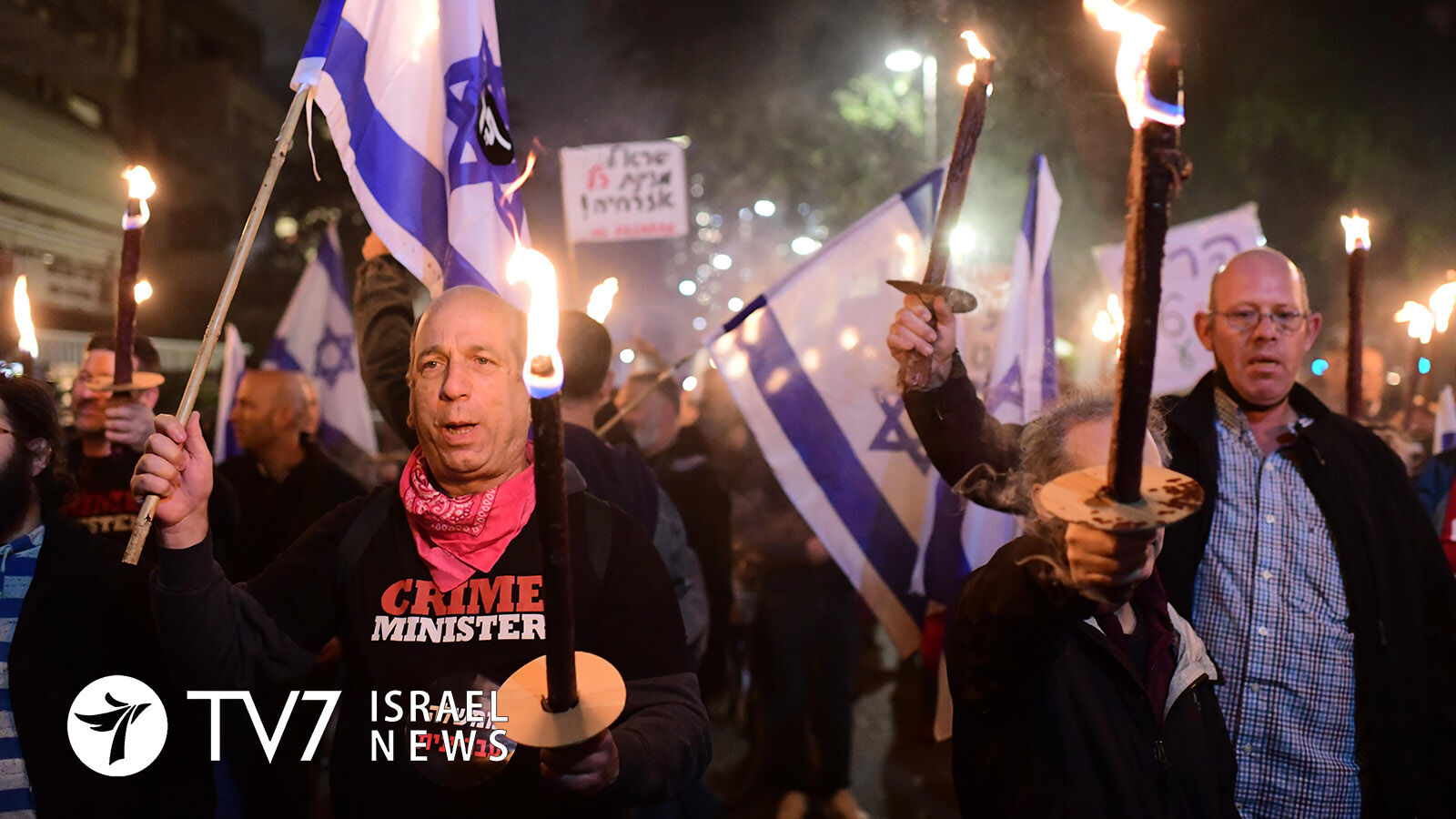Demonstrators gathered in central Tel Aviv to express opposition to the right-wing, nationalistic coalition led by Prime Minister Benjamin Netanyahu.
By Erin Viner
Up to 30,000 people – including current and former Members of Knesset (MKs) and ministers – gathered in the Habima Square.
Many waved signs reading, “Together against fascism and apartheid” and “Democracy in danger.” Several in the crowd marched with torches and carried banners printed with “Crime Minister” – a taunt used by left-wing Israelis during frequent protests against Netanyahu’s trial on criminal charges, which he denies. Others reportedly shouted, “incitement begins in the halls of government” and “Netanyahu is dangerous, corrupt and racist.”
The sponsors called for participation by all those “against the coup d’etat carried out by the criminal government which threatens to harm all citizens whoever they are.”
Asserting that “extreme and dangerous elements in the new government” are trying to “harm us all,” the left-wing peace activist Standing Together and “Crime Minister” protest groups accused the ruling coalition of discriminating against Arab citizens, as well as others due to gender or sexual identity bias. “We won’t sit at home twiddling our thumbs and we won’t lose out to despair and frustration. Wherever there is a battle, there is hope, and we will go out and struggle for our home,” said a joint statement by the groups. The anti-Netanyahu “Black Flags” movement described the rally as “a preventative strike against dictatorship.”
The Saturday night rally came in the wake of controversial plan of wide-ranging changes to the nation’s judiciary proposed by newly sworn in Justice Minister Yariv Levin that would enable the government to surpass rulings by the Supreme Court, gain control over judicial appointments and forego previous mandates to consult legal advisers appointed by the nation’s attorney general.
The Supreme Court is the highest Court of Appeal in the State of Israel, and also serves as a High Court of Justice (Bagatz), hearing Petitions against various governmental authorities at first instance as well as against rulings of Appeals Tribunals.
Levin presented a sweeping “reform of governance” he has been working on for two decades, that would restore power to elected officials rather than those who he and his supporters consider to be overly-interventionist and left-wing judges.
Netanyahu, who returned to power after winning the 1 November election pledged during a recent speech to “undertake reforms that will protect the right balance between the three branches.” The Prime Minister has campaigned against the judiciary since being indicted for corruption. Strongly maintaining innocence on the charges, Netanyahu alleges he has been the victim of a “witch hunt” by prosecutors, police and a hostile media.
Opposition leader and former premier Yair Lapid immediately denounced the reforms. “Those who carry out a unilateral coup in Israel need to know that we are not obligated to it in any way whatsoever,” Opposition leader and former Premier MK Yair Lapid wrote on Twitter, underscoring, “We will not only fight in every possible way against each and every one of the measures Levin will be announcing this evening. I am saying in advance that we will reverse them the moment we return to power. Anyone who carries out a unilateral revolution against the system of government in Israel should know that we are in no way committed to it.”
MKs who participated in the Tel Aviv protest included Chairman of the far-left and predominantly Arab Hadash-Ta’al alliance Ayman Odeh, leader and former minister MK Merav Michaeli and MK Gilad Kariv of the center-left Labor faction. “Together with thousands of wonderful protesters we went to demonstrate and shout in a clear voice – we won’t allow our country to be ruined!” Michaeli later wrote on Twitter, adding, “We will continue to fight for our democracy.”
Former deputy premier and minister Tzipi Livni, who was also present, had on Friday condemned the Netanyahu coalition during a conference of the Movement for Quality Government.
Hundreds of other protestors affiliated with the the Darkenu movement rallied on Friday in front of Minister Levin’s residence to argue that his proposals would obliterate Supreme Court protection of IDF troops from prosecution by the International Criminal Court (OCJ). The civil society’s CEO and former Kulanu MK Rachel Azaria claimed Levin’s reforms would “weaken the justice system would hurt IDF soldiers, and hurting our soldiers is a red line,” underscoring, “We demand that Minister Yariv Levin not abandon our soldiers to the Hague.
Last week the United Nations General Assembly (UNGA) passed a resolution calling for an opinion by the International Court of Justice (ICJ) on legal consequences of Israel’s so-called occupation of Palestinian territories. Israel captured most of the areas disputed by the Palestinians in the 1967 Six Day War, when it conquered the east side of a then-divided Jerusalem and parts of the West Bank from Jordan; in addition to the Golan Heights from Syria and Gaza from Egypt.
The Palestinians, rejected a peace plan proposed by former-United States President Donald Trump, demand the captured territories for a future state.
The Hague-based ICJ, also known as the World Court, is the top UN court dealing with disputes between states. While its rulings are considered binding, the ICJ has no power to enforce them.
Strongly refuting UNGA vote, Prime Minister Netanyahu said, “The Jewish people are not occupiers in their own land nor occupiers in our eternal capital Jerusalem and no UN resolution can distort that historical truth,” Israeli asserted in a video message, adding that Israel was not bound by the “despicable decision.”
He went on to insist, “Just like the hundreds of distorted UN General Assembly resolutions against Israel over the years, today’s disgraceful resolution will not obligate the Government of Israel.”
